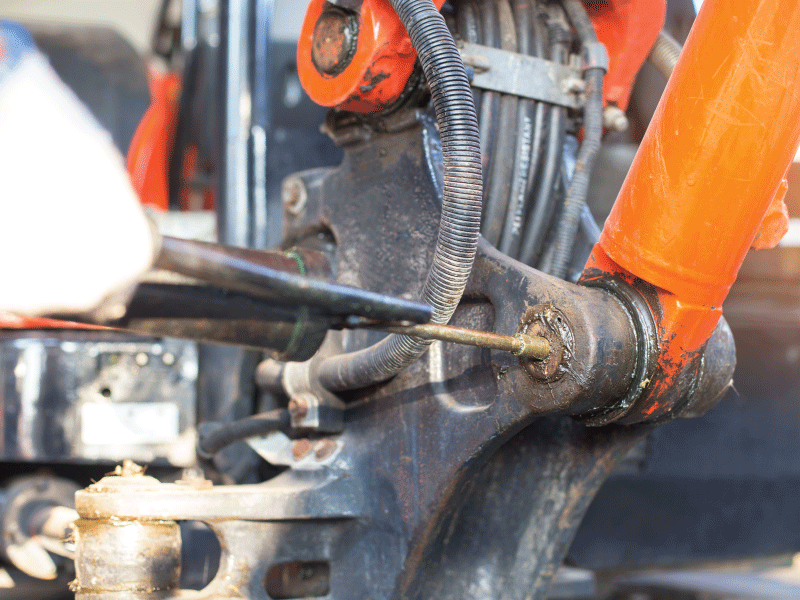These days, you will find talk about companies adopting “environmentally responsible” initiatives everywhere. Sustainability and renewability with the least impact on the natural ecosystem have become the mantra for many organizations – particularly for those who perform work outdoors in construction, marine & dredging applications, mining, oil & gas, and government infrastructure. Therefore, utilizing lubrication that coincides with a company’s ESG (Environmental, Social & Governance) goals – whether mandated by regulations (i.e. EPA and federal requirements for Environmentally Acceptable Lubricants [EALs]) or voluntarily as part of the organization’s overall sustainability strategy – should be considered when planning projects. When operating equipment in the field, you must ensure that you maintain proper lubrication for proper function and to avoid costly repairs. But, even when taking the utmost care, there’s always the risk of leaking lubricants into the environment. It may be time to consider a bio-based grease.
What Is a Grease?
Greases are oil-based lubricants thickened with agents to form a solid or semisolid. The American Society for Testing Materials (ASTM) defines a grease as: “A semisolid or solid combination of a petroleum product (or in biobased greases a natural ester base oil) and a soap i.e., lithium, calcium sulfonate, etc., or a mixture of soaps, with or without fillers, suitable for certain types of lubrication.” Common uses of grease include those used on the chassis of a machine or those used in wheel bearings.
Selecting a Grease
When choosing greases, it is important to focus on all the challenges presented by the application including but not limited to:
- RPMs
- environmental operating temperatures
- heavy loads
- heat
- moisture levels
- direct water contact
Plus, one must consider how accidental or incidental release into the environment may have long-term adverse environmental impacts. In fact, many grease applications are designed for old grease to leak out, be purged or be used up in the applications. Greases are not changed or recycled like many lubricants can be – greases are lost to the environment.
About Bio-Based Greases
Currently, the most popular greases are mineral (petroleum) based. However, while mineral-oil-based greases can perform well, natural ester-based greases like those from BioBlend’s BioGrease lines have inherent advantages that mineral oils cannot reach without significant additional additives. Additionally, mineral-based greases are inherently biodegradable, not readily biodegradable. If exposed to the natural environment, mineral-based lubricants may take a long time to degrade to a point where they no longer have a significant negative effect on the environment. In fact, only 15-35% of inherently biodegradable (mineral-based) products will biodegrade in 28 days, whereas a readily-biodegradable bio-based lubricant such as a biobased grease will biodegrade 60-90% within the same timeframe. Biobased lubricants use natural plant esters and select synthetic esters as their base oils. Therefore, they are readily biodegradable. In fact, most of BioBlend’s BioGrease products are classified as Environmentally Acceptable Lubricants (EALs). However, that’s not the only advantage to using a bio-based grease. Some other advantages include:
- Higher Viscosity Index – Base oil stability as operating temperatures change
- Excellent lubricity – Ability to maintain film strength at higher temperatures
- Higher flash point – Safer operations especially at higher temperatures
- Polarity – Provides a base level of natural resistance to water wash-out in wet conditions even before any additives are added.
Therefore, you can expect excellence performance in the field in many cases superior to that of traditional mineral-based greases.
Explore BioBlend Greases
Learn more about some of BioBlend’s lineup of greases:
- BioGrease EPIC Drill Rod – This readily biodegradable drilling lubricant is excellent for high temperature, high-pressure, and heavy-load applications for the drilling industry.
- BioGrease GP – A general all-purpose EAL grease thickened with a shear-stable lithium soap.
- BioGrease HD – If you need a heavy-duty, minimally toxic Lithium 12-OH Stearate grease with high film strength for high temperatures, this product is for you!
- BioGrease FS1 – For your low-temperature projects, BioBlend formulated this environmentally acceptable grease for some of the toughest conditions with mobility in temperatures as low at -40°
- BioGrease PPG – This plunger-packing grease is a favorite among operators of triplex and quintuplex pumps with its biodegradability, low-temperature performance, and proven effectiveness as a seal between packing and liners.
- BioGrease WL 2 – You can count on this premium quality multipurpose white lithium grease for to keep your equipment in great condition.
Take a look at our full line of grease products or contact us to find out how we can assist you in reaching your operational, cost and ESG goals. You may also reach us at +1-888-BIO-BLND (888-246-2563).

